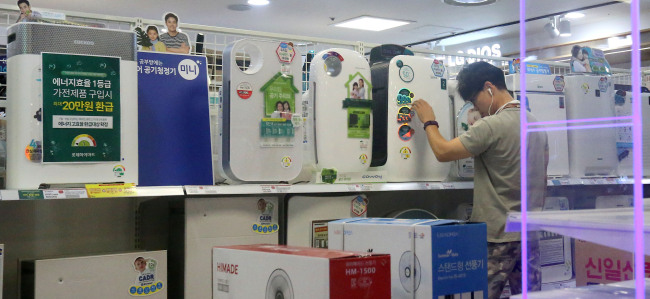Air purifier companies found to have used toxic air filters agreed recently to revise product regulation standards, a source said Sunday.
According to the source from the Korea Air Cleaning Association, the decision was made after a closed-door meeting last week to discuss how to deal with disputed air filters manufactured by 3M.
An experiment last month by the Environment Ministry showed that the filters contained Octylisothiazolinone (OIT), which has been classified as a harmful substance since 2014 since the humidifier disinfectant tragedy here. One of the disinfectants had contained OIT.
The meeting was attended by officials from the KACA and representatives from local air purifier manufacturers including Samsung Electronics, LG, Cuckoo and Winia.
 |
Yonhap |
To improve product safety and dispel public anxiety, companies said they agreed to revise the current regulation standard and ask the Environment Ministry to strengthen control of chemicals used in filters.
Currently, electronic home appliances are supervised by the Ministry of Trade, Industry and Energy under the Electrical Appliances Safety Control Act. Air filters are not included in the list for ministry supervision because they are considered electronic components.
According to the regulation, the ministry-designated association is in charge of the authentication process for air purifiers.
Since 1998, the KACA has been giving Clean Air authentication marks to air purifiers based on the functions of the product, such as deodorization efficiency, noise level and dust collection efficiency.
A total of 113 air purifier models from 24 local brands including Samsung Electronics, LG, Coway, Chungho Nice, Winia, Cukcoo, have acquired this Clean Air mark.
The revised authentication standard will include stricter safety test for filters. Five chemicals -- OIT, CMIT, PHMG, PGH and MCIT -- will be banned from use in manufacturing filters. These are the chemicals that were found to have been used in toxic humidifier disinfectants, which caused at least 200 deaths since 2011.
Substances designated as harmful in other countries and uncertified sterilizing chemicals will also be banned from being used in filters.
If a company breaches the above regulations or cannot provide documents to prove product safety, they will not be able to acquire the Clean Air mark.
“It is true that the current authentication standard did not fully consider the safety of air purifiers,” one of the attendees at the meeting was quoted as saying.
“Although it may seem like 20-20 hindsight, we believe the related ministries and customers will welcome our idea of a stricter authentication process, which is aimed at putting customer safety first before anything” the official added.
According to a local news report, 3M sold over 720,000 filters to local companies from 2014 to May this year. This accounts for 80 percent of the total number of filters sold in the market.
Amid moves to recall the products out of concern, the corresponding companies last week announced that they would offer free filter replacements to customers.
By Kim Da-sol(
ddd@heraldcorp.com)








![[Today’s K-pop] Blackpink’s Jennie, Lisa invited to Coachella as solo acts](http://res.heraldm.com/phpwas/restmb_idxmake.php?idx=644&simg=/content/image/2024/11/21/20241121050099_0.jpg)